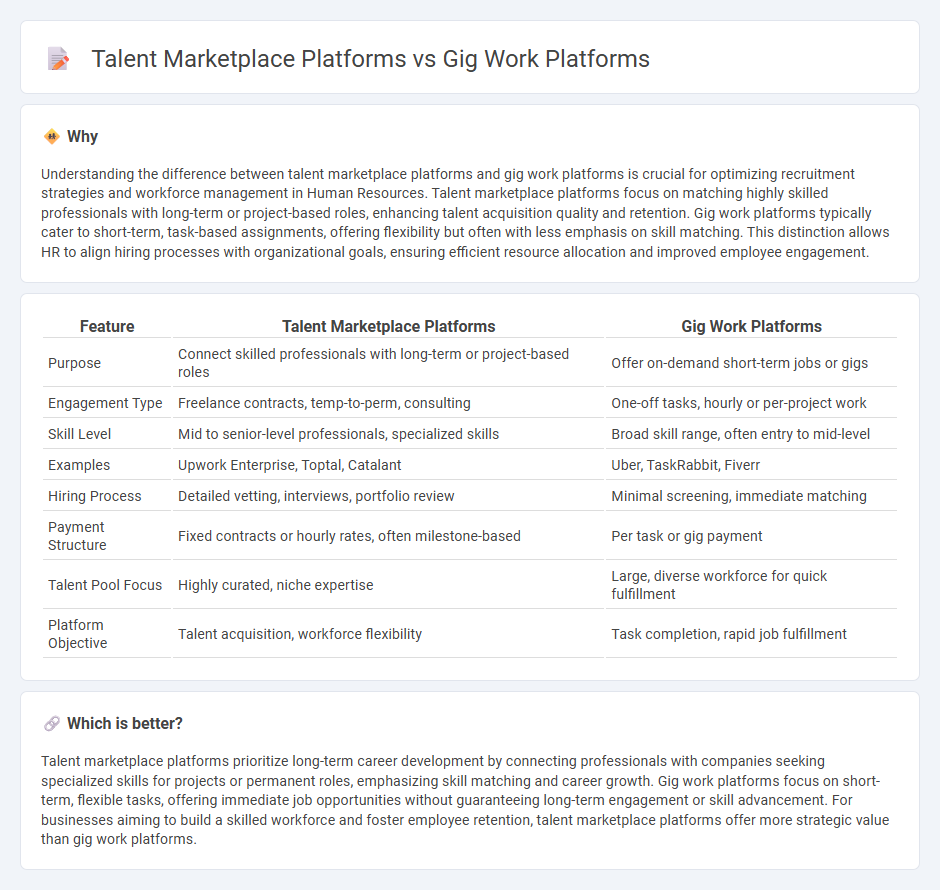
Talent marketplace platforms connect skilled professionals with long-term employment opportunities within organizations, emphasizing career development and organizational fit. Gig work platforms focus on short-term, task-based engagements, offering flexibility but often lacking stability and benefits. Explore the differences and advantages of each platform to determine the best fit for your workforce strategy.
Why it is important
Understanding the difference between talent marketplace platforms and gig work platforms is crucial for optimizing recruitment strategies and workforce management in Human Resources. Talent marketplace platforms focus on matching highly skilled professionals with long-term or project-based roles, enhancing talent acquisition quality and retention. Gig work platforms typically cater to short-term, task-based assignments, offering flexibility but often with less emphasis on skill matching. This distinction allows HR to align hiring processes with organizational goals, ensuring efficient resource allocation and improved employee engagement.
Comparison Table
| Feature | Talent Marketplace Platforms | Gig Work Platforms |
|---|---|---|
| Purpose | Connect skilled professionals with long-term or project-based roles | Offer on-demand short-term jobs or gigs |
| Engagement Type | Freelance contracts, temp-to-perm, consulting | One-off tasks, hourly or per-project work |
| Skill Level | Mid to senior-level professionals, specialized skills | Broad skill range, often entry to mid-level |
| Examples | Upwork Enterprise, Toptal, Catalant | Uber, TaskRabbit, Fiverr |
| Hiring Process | Detailed vetting, interviews, portfolio review | Minimal screening, immediate matching |
| Payment Structure | Fixed contracts or hourly rates, often milestone-based | Per task or gig payment |
| Talent Pool Focus | Highly curated, niche expertise | Large, diverse workforce for quick fulfillment |
| Platform Objective | Talent acquisition, workforce flexibility | Task completion, rapid job fulfillment |
Which is better?
Talent marketplace platforms prioritize long-term career development by connecting professionals with companies seeking specialized skills for projects or permanent roles, emphasizing skill matching and career growth. Gig work platforms focus on short-term, flexible tasks, offering immediate job opportunities without guaranteeing long-term engagement or skill advancement. For businesses aiming to build a skilled workforce and foster employee retention, talent marketplace platforms offer more strategic value than gig work platforms.
Connection
Talent marketplace platforms and gig work platforms are interconnected by facilitating flexible employment opportunities and enabling companies to access a diverse pool of skilled professionals. These platforms leverage advanced algorithms and data analytics to match talent with projects or roles based on specific skills, experience, and availability, optimizing workforce efficiency. Integration of these platforms empowers Human Resources to streamline recruitment processes, reduce hiring costs, and support agile workforce management strategies.
Key Terms
Independent Contractors
Gig work platforms cater to independent contractors by offering short-term, task-specific jobs often facilitated through mobile apps that connect workers with clients instantly. Talent marketplace platforms provide a broader range of project-based opportunities, emphasizing skill matching and long-term engagements between professionals and businesses. Explore how each platform type enhances independent contractor opportunities and shapes the future of freelance work.
Skill Matching Algorithms
Gig work platforms typically use basic skill matching algorithms centered on task requirements and availability, ensuring rapid connections between freelancers and employers. Talent marketplace platforms employ advanced machine learning models that analyze deep skill sets, past project success, and cultural fit for more precise matches. Explore further to understand how these skill matching algorithms enhance hiring efficiency and project outcomes.
On-Demand Workforce
Gig work platforms connect freelancers with short-term tasks, emphasizing immediate availability and project-based assignments that cater to real-time business needs. Talent marketplace platforms provide a broader range of professional services, allowing businesses to engage specialized experts for both short-term gigs and long-term projects, often emphasizing skill matching and quality assurance. Explore how these platforms transform workforce management and optimize on-demand talent acquisition.
Source and External Links
Upwork - A platform for freelancers to offer services in various fields like design, IT, and writing.
Fiverr - Known as the largest global network of freelancers offering services starting at $5.
GigSmart - Offers in-person shift work opportunities across various industries with flexible scheduling.
99 Designs - A platform where creatives can compete for design projects.
Gigster - Specializes in IT and software development projects, requiring a screening process for participants.
Crowdspring - Focuses on creative projects, using an auction-style method for designers to secure work.
TaskRabbit - A platform for local errand and task-based services, often involving in-person work.
Tongal - Connects content creators with brands for innovative projects.
Rover - Specializes in pet-sitting and dog-walking services.
 dowidth.com
dowidth.com